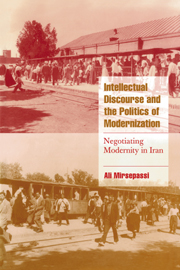Book contents
- Frontmatter
- Contents
- Acknowledgments
- Introduction: modernity and “culture”
- 1 Western narratives of modernity
- 2 Reconciling with the West's Other
- 3 The crisis of secularism and the rise of political Islam
- 4 Islam as a modernizing ideology: Al-e Ahmad and Shari'ati
- 5 German intellectuals and the culture of modernity
- 6 The tragedy of the Iranian Left
- 7 Modernities of our time
- Notes
- Bibliography
- Index
3 - The crisis of secularism and the rise of political Islam
Published online by Cambridge University Press: 06 October 2009
- Frontmatter
- Contents
- Acknowledgments
- Introduction: modernity and “culture”
- 1 Western narratives of modernity
- 2 Reconciling with the West's Other
- 3 The crisis of secularism and the rise of political Islam
- 4 Islam as a modernizing ideology: Al-e Ahmad and Shari'ati
- 5 German intellectuals and the culture of modernity
- 6 The tragedy of the Iranian Left
- 7 Modernities of our time
- Notes
- Bibliography
- Index
Summary
People always quote Marx and the opium of the people. The sentence that immediately preceded that statement which is never quoted says that religion is the spirit of a world without spirit. Let's say, then, that Islam, in that year of 1978, was not the opium of the people precisely because it was the spirit of a world without a spirit.
Michel FoucaultIntroduction
We can only appreciate the perplexing meanings of the Iranian Revolution of 1978–79 by exploring such de-familiarizing statements. Building on my analysis of the Mashruteh movement, this chapter attempts to go beyond the prevailing interpretations that explain the Iranian Revolution as an extension of the historical tensions between “tradition” and “modernity.” I will look at the rise of Islamic politics as a new effort to come to terms with the challenge of modernity in Iran.
The Revolution was a historical turning point in the crisis of modern secular politics in Iran. Impeded by the autocratic rule of the Pahlavi state for more than two decades (the 1960s and 1970s), secular democratic politics were effectively contested in Iran and a new theocratic state power ascended to lead the Revolution in the absence of any other viable political alternative.
The following analysis of contemporary Iranian political history will underscore three intertwining processes in contemporary Iranian socio-political life. The socio-historical processes that we will address in more detail are: (1) the formation of an autocratic state in post-1953 Iran, which successfully destroyed the already fragile democratic secular political institutions (political parties, unions, and Parliament) in Iranian society; (2) the social and psychological alienation experienced by Iranians as a reaction to the processes of “modernization” in the 1960s and 1970s.
- Type
- Chapter
- Information
- Intellectual Discourse and the Politics of ModernizationNegotiating Modernity in Iran, pp. 65 - 95Publisher: Cambridge University PressPrint publication year: 2000



